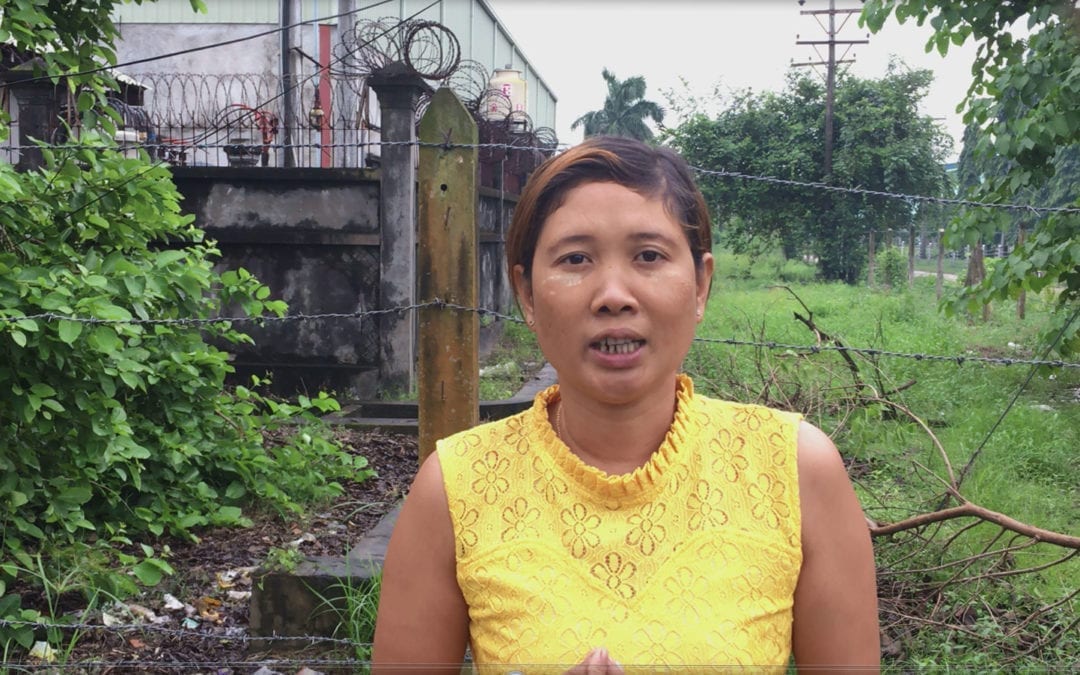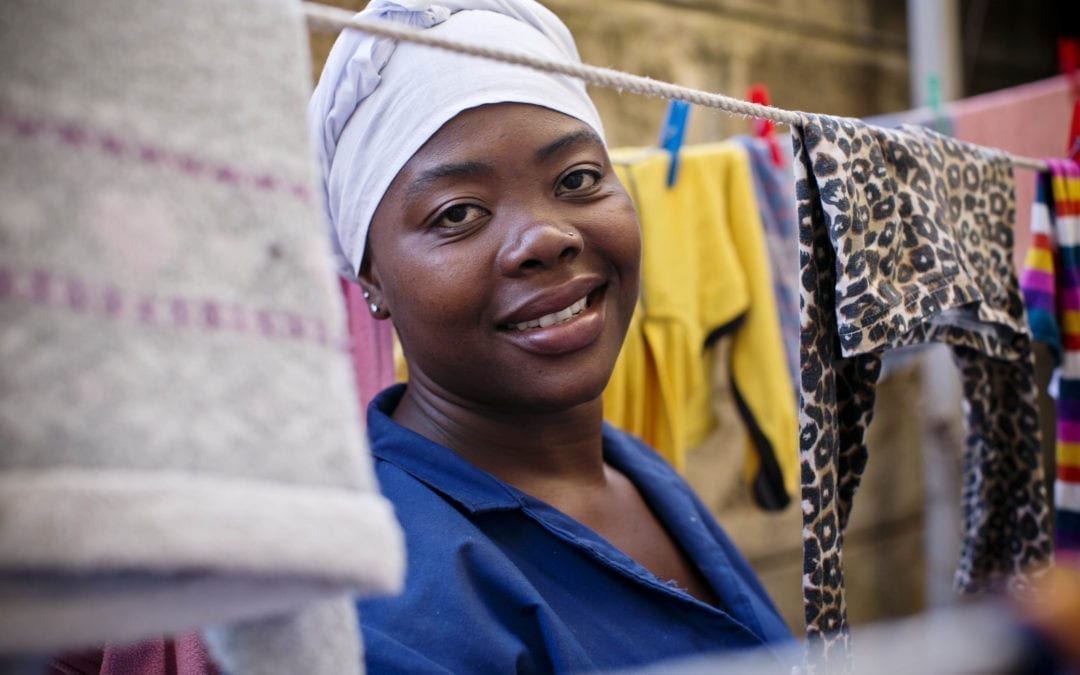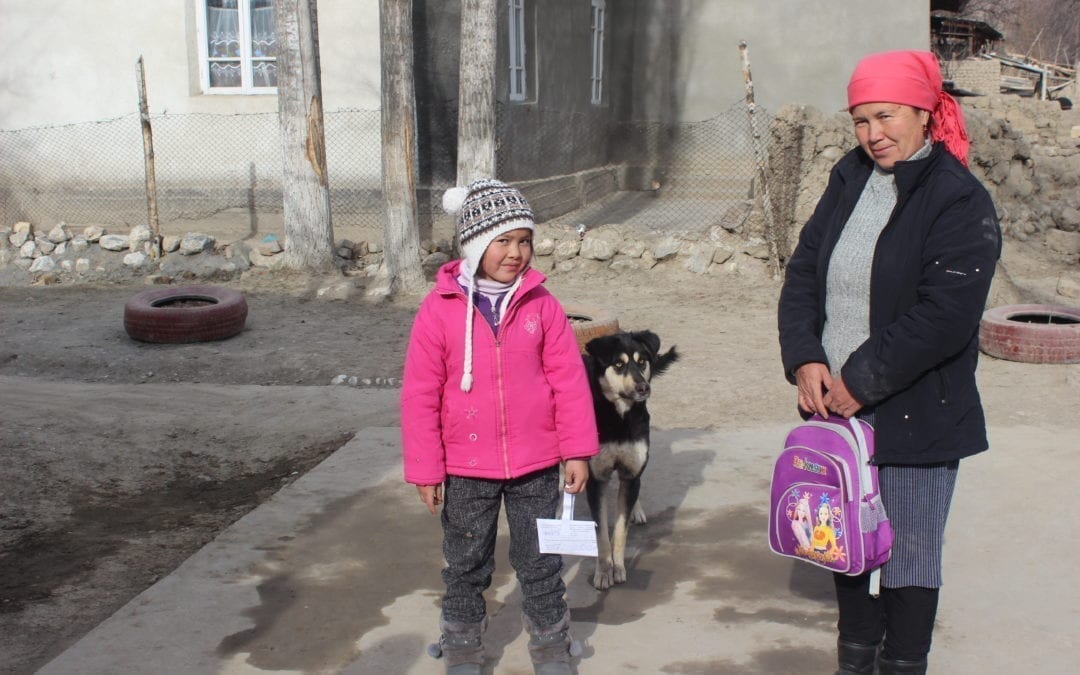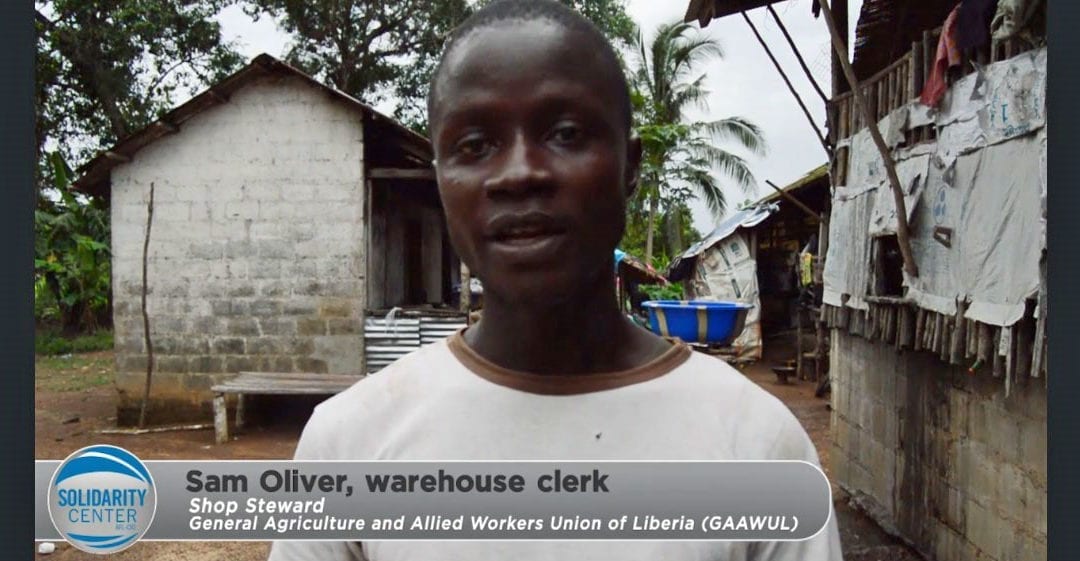
Lwin Lwin Mar, Burmese Garment Worker Gains Rights at Work through Union
I am Ma Lwin Lwin Mar and 34 years old. I come from Ngaputaw Township in Ayeyarwaddy Region to Hlaing Thar Yar and work in a garment factory. (Hlaing Thar Yar is a factory district outside Yangon, Myanmar’s capital, where 700,000 workers make clothes and goods for western brands.)
I work in the garment factory for my living and to support also my family.
While working here in the factory, CTUM (Confederation of Trade Unions-Myanmar) came and formed the trade union in November 2013. After formation of the trade union, 204 workers were dismissed by the factory owner without any reason and unlawfully in regard to the issue on (minimum daily wages of Kyat) 3,600 ($2.80).
When they tried unlawfully to dissolve our trade union, CTUM supported our organization very strongly. Because of the strong support of the CTUM, all the workers could come and work again at their worksites peacefully.
Therefore we would like to say that CTUM has taken the responsibility to solve all the unfair activities of the garment factory owner and take care of the workers when the factory owner and CTUM tried to settle.

Lucy Nyangasi, Domestic Worker in Kenya
“I am from Butere, western Kenya in Kakamega Country. I came to Nairobi to work in 2012 to look for a job to see how I can help myself and my family.
I am married. I was 16 years old when I got married. My husband is at home in Kakamega. My husband does casual work and does farm work. I have two children. One is around six years old and the other is still young, around four years old. They stay at home in Kakamega. My husband looks after them as well as my mother-in-law.
It was my decision to come to work in Nairobi because I needed to help my husband so that we can raise our family. I didn’t have a job when I came to Nairobi and so I came looking for a job. It took around two months to find a job; I stayed with some in-laws. I had a friend of my in-laws and she heard of this job, so it was through word of mouth. The job comes with a place to sleep. I go back to Kakamega to see my family in Nairobi on Saturday until Sunday and after one or two months, I go for three to four days to Kakamega and then I come back.
I went to school until I was around 15, but I didn’t continue. My parents did not have money so I couldn’t finish. I have three sisters and two brothers. Two of them have finished school and two of them haven’t. One sister and one brother finished school, but I didn’t. My favorite subject at school was science. I liked science because I wanted to be a doctor when I grew up but couldn’t because I didn’t have the money.
Paid on Time and Encouraged to Study
My employers are good to me. I get given food and meals three times a day, and time off. On Sundays, I am off and will go and see my family in Nairobi or friends. I will then travel home to see my children every six weeks by bus.
I start work at 5:30 a.m. and will first of all get the children up and dressed and give them breakfast. I will then send them off to school and clean the house. I will do the washing up and ironing and make sure everything is ready when they get home from school. Then I will help them have tea and cake.
My salary is around 10,000 Kenyan shillings (about $97) per month, but I also get my accommodation and food paid for. I also get a uniform. I send most of this money back home to Kakamega to pay for the school fees for my children but I also try and save some.
My employer is very good to me and is encouraging me to do a course in computers so I am hoping to start this soon. I would like to be better qualified so that I can go and get a better job and earn more money.
‘I Miss My Children’
I know that some girls are not as lucky as me and are not treated well. I have heard of girls who are not paid by their employers and are forced to work very bad hours for free. Some girls are beaten, too, but are too scared to go to the police.
They also have no money or means to escape or go back home. I have also heard how some girls are forced to sleep with their employers, but if this happens girls are often too ashamed to talk about it.
The hardest part of my job is being away from my children. I miss them.”
Lucy Nyangasi is a member of Kenya Union of Domestic, Hotel, Educational Institutions, Hospitals and Allied Workers (KUDHEIHA).

Gaining Economic Security in Rural Kyrgyzstan
In 2011, Anziret Urazbaeva saw her family in Kyrgyzstan separated as her husband, Gulamali Urazbaev, was forced to migrate to Russia for work. With no jobs available in Kyrgyzstan and the family struggling to secure food and other basics, Urazbaev, 46, a primary school teacher, left Anziret, his two sons and a daughter, and found a job at a construction company in Khimki, northwest of Moscow.
Working first as a painter and later laying mosaic tiles, Gulamali was punished by his employers, who reduced his wages because he lacked experience. Like most migrant workers, he sent most of his earnings home.
In 2014, Urazbaev lost his job in Khimki and was invited by friends to work in Sakhalin to pack frozen fish at a factory. His son, 18, joined him, to help the family. But Urazbaev’s wages again were cut, this time by an employer who cited the nation’s economic crisis as justification.
Back in Kyrgyzstan, Anziret, 44, tended cattle and a small plot of land—until she saw an opportunity to achieve a measure of economic independence. By taking part in a seminar organized by the Solidarity Center in cooperation with the Garment Workers’ Union, which represents rural women artisans, Anziret learned how to create hand-made products like scarves from the wool of her sheep and goats.
As she sells her goods, she hopes to launch an income-generating business and ultimately not rely solely upon the remittances from her husband and son to feed her family.

Sam Oliver: Helping Liberia Rubber Plantation Workers Get a Voice on the Job
“When this union took over, people lived in deplorable housing. Through the intervention of this union, you can now see they are renovating some of these houses and negotiation is on the table so they can fast track the renovation.”

‘After a Day’s Work, We Are Happy to Still Be Alive’
Win Nay Aung Thant works from 7 a.m. to 6 p.m. or 7 p.m., at a garment factory in Myanmar and is paid just enough to survive. The factory’s electrical wiring is unsafe and Win says “after a day’s work, we are happy to still be alive.”
